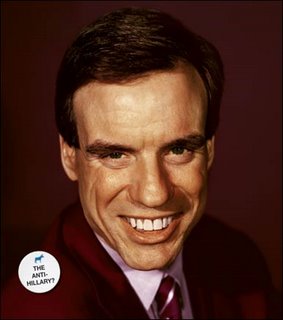I wasn't going to opine on Jerry's post in which he bemoans his baseball hero and mine, Barry Bonds, for using steroids to provide us with so many great memories over the past decade. But then he had to go and lure me into the debate, and so I meekly write this post, fearful of how else I can be played like a fiddle.
In any case, he is correct. I do disagree with the widely accepted sky-is-falling premise re: Bonds and steroids. To begin with, we're talking about a game, albeit a popular and lucrative one -- but a game nonetheless. (And this is a guy who took an extra long lunch break today to watch the U.S.-Canada World Baseball Classic game in its entirety.) Sports Illustrated did not report that Bonds bet on Giants results, or threw games, or once killed a man, or stole money, or wrote policy based on campaign checks. No, Barry Bonds, over the years, did certain things that were in no way contrast to -- watch my language here -- what his industry's culture permitted.
This tearing-of-clothing caterwauling routine I keep reading about -- from "serious" news columnists to the otherwise snarkiest of blogs -- would be a whole lot easier to swallow if Major League Baseball, his team, the media, government or even the fans had raised even a peep of protest years ago. Everyone, including the people most invested in the matter, had all the evidence they needed to raise concerns in the late '90s and, as has been reported frequently, nobody did. Hence the title of this post, the reference to which I'll just assume everyone understands. Anyway, like I keep saying, what Bonds did (and, for what it's worth, countless other players -- don't forget, only Bonds has the profile to merit this much research) is just as "illegal" in my eyes as speeding on the highway. Sure, it's against the law, and sure, if we're dumb enough to get caught we deserve what punishment we get. But
everyone does it -- it's just simply accepted as part of our culture.
Set aside the more sexy issue of steroids for a second. Greenies and uppers have been around the game for decades, at least
as far back as the 1960s. There is no doubt about it -- without these pills, ballplayers would be fatiguing in massive and notable ways toward the final quarter of the marathon season. Where is the outrage that so many players used sorta-kinda illegal enhancements then -- and
continued to widely do so up to this year? So suddenly, it's the modern era, players are naturally bigger and stronger, flights are longer, playoffs go deeper, media and public demands are more intense and the enhancements grew up along with the game. I'm not condoning their use, I repeat, I'm just noting that no one else did for years and years and years. I was never in a baseball locker room in the 1990s. I didn't have the access hundreds of men and women did and so my blissful ignorance is understandable. But for the same reporters and baseball officials who wink-winked a generation of players dependent on various pills and injenctions to now beat their chests in outrage of Bonds' habits is silly at best, hypocritical at worst.
I specifically protest a number of Jerry's claims. But I do not argue with him that the only solution to this murky morass lies within the federal government fashioning a broad ruling on the matter and ending this chapter. The game will suffer, and so be it, but the hearings must become legislation,
stat. It's not unlike gun laws, really -- Americans can own as many steroids as they like, but it is government's job to make sure legions don't die from them. But I argue with some of Gerald's larger generalizations. To begin with, Bonds was not paid tens of millions of dollars because he's a role model. He's thrust into being a role model because some people (like me) have messed-up priorities and idiolize anyone genetically lucky enough to earn such a salary. At no point do owners give out contracts to nice guys over good players. Players are paid to hit, throw and run -- if they also happen to embrace the public, bully for them. If not, they're still gonna get paid. So enough with the "how could Bonds let down the kids" boo-hooing -- he never asked to be a role model, he has no intentions of living the life of a role model/saint and he shouldn't be expected to simply because his DNA is superior. We have to stop confusing the ideal and the reality.
Secondly, Jerry wants to cheat on his taxes because Bonds made cheating kosher. Well, cheating on taxes directly hurts others by limiting funds that go to all sorts of important causes and, as I've stated, Barry hasn't directly hurt a soul. But more importantly, this just isn't a slippery slope situation. When Clinton was getting hummers in the Oval Office, does Jerry really think that oral sex in this country skyrocketed? When Enron folded because of illegal bookkeeping, does Jerry think CEOs all over America rushed to open their own off-shore accounts? When the Jayson Blair and Stephen Glass scandals were brewing, does Jerry truly picture hordes of journalism-school kids snapping their fingers and saying, "Of course! Plagiarism!" I just don't see Bonds having the kind of effect others envision. Lastly, Jerry's "when we buy that ticket, we're paying for something with integrity" bit is totally hogwash, and he knows it. I've sat through dozens of baseball games with Jerry (although it's been way too long) and not once have we driven home from a real snoozer with him saying, "I liked it. There was a lot of integrity." We all root for our teams to do well, and if not that, then for the pitchers throwing gas, the bashers hitting 'em into the next county and the speedsters stretching everything into a triple. That's what we pay to see -- if some "integrity" happens to get into my fun at the ballpark, huzzah. But it's entertainment, highly religified entertainment. (Of course, when the players struck for more money in 1994, that was devoid of honor -- but that's a whole 'nother thing.)
Anyway, I didn't really get around to the points I initially wanted to make -- including that Bonds-haters should keep in mind last year, when after missing 150 games and allowing for the most rigorous testing in MLB history, he still hit an unworldly home run every
eight at bats -- but I think I responded to the general notions floated by Jerry and the rest of the rabid jackals yipping themselves into a frenzy over the Chronicle reporters' revelations. I love baseball as much as the next guy (providing I'm standing next to Jerry and not Harry, that is) but I fail to see how we can all be so ashamed. When Mark McGwire became a muscle-bound home run machine, we loved him, but hated Bonds. So an insecure Bonds did what he thought we must want, and followed down McGwire's path. So who's really to blame, here? The answer, sports fans, is not
black and white.





